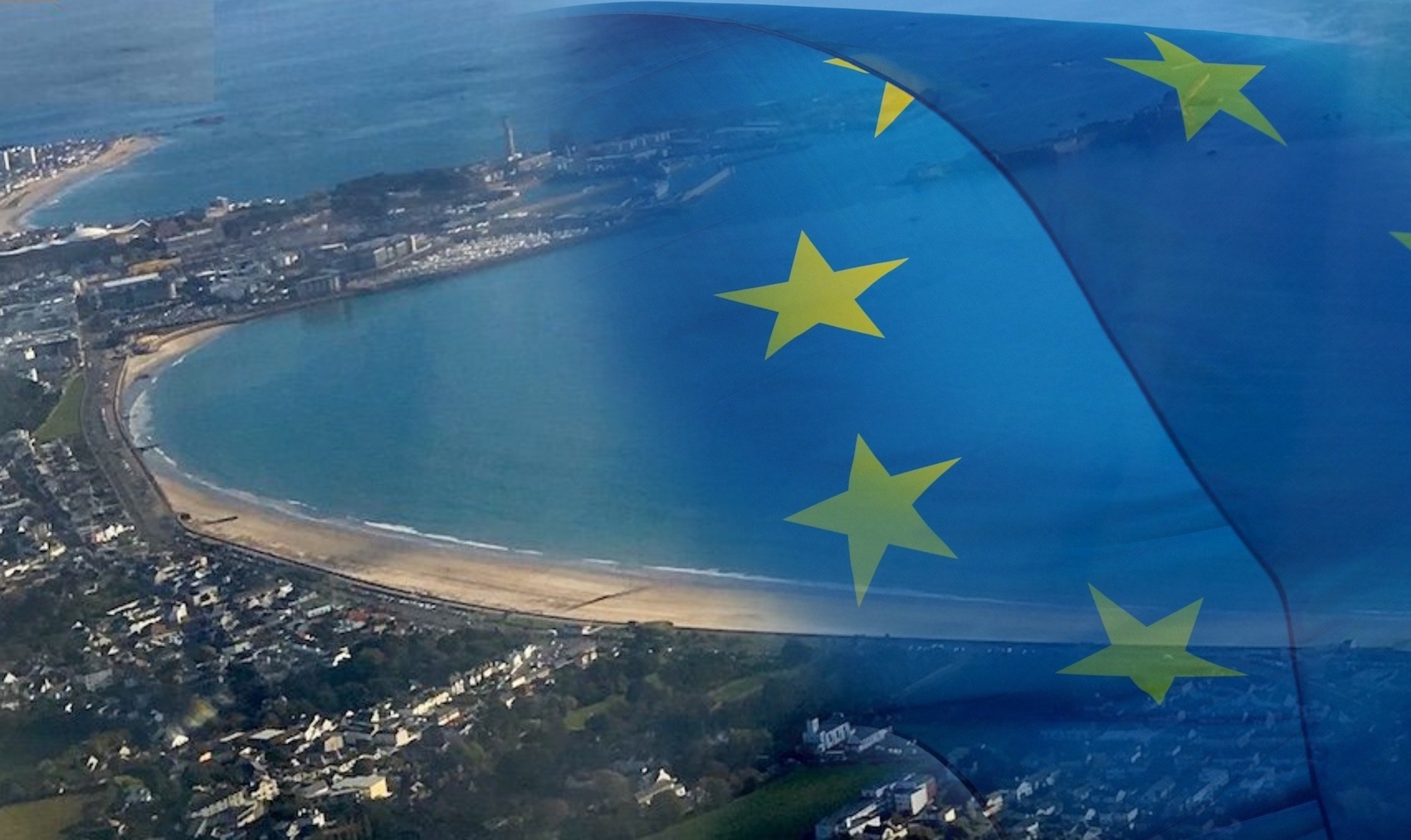


More than £14m in Jersey bank notes was repatriated from the UK to Jersey over a three-year period – but officials are unclear as to how or why the local tender, which cannot be spent abroad, ended up there.
Were these ill-gotten gains linked to local drug-trafficking? Or was this simply a case of too many tourists not realising they’d taken home unspendable notes?
The issue is, Jersey’s authorities simply didn’t know – which is one of the reasons the island was last week ranked ‘medium to low’ risk of being used as a channel for terrorist money.
See, while Jersey’s long-awaited ‘National Risk Assessment of Terrorist Financing’ didn’t uncover any hard proof that terrorists had abused the island’s finance system, it did reveal huge gaps in the authorities’ knowledge about the money flowing through the island – the mystery banknotes being just one example.
Other issues included worries that there simply wasn’t enough expertise in Jersey to understand and deal with the threat, and the fact that Jersey is behind in implementing two key global standards.
Express digs into what we don’t know about the money flowing through Jersey, why that puts us at risk of financing terrorism, and how the Government wants to plug those knowledge gaps….
While some may think the threat of terrorists actually using Jersey as a conduit for their cash is low, the island is obliged to stay on alert to meet international obligations and maintain its position as a leading International Finance Centre.
Crucial to that is getting a glittering assessment from MONEYVAL.
It’s a body of the Council of Europe, which independently assesses compliance with ‘Financial Action Task Force’ (FATF) recommendations.
Last time, Jersey came out well, being deemed compliant with 48 of 49, and near topping rankings alongside Guernsey.
But the upcoming assessment is set to have trickier hoops to jump through.
Whatever the result, there’ll be reputational consequences – something the island has been extremely sensitive to following the Panama and Paradise Papers revelations in recent years, and the EU’s recent pledge to tighten the criteria of its ‘tax haven’ blacklist.

Pictured: The EU has Jersey in its sights ahead of a tightening of its 'blacklist' criteria.
It’s in everyone’s interest for the outcome to be a good one. The finance industry was assessed as being worth nearly £2bn to the island in 2019 – more than a third of the island’s whole economy.
In preparation for MONEYVAL, the Government and other key authorities have carried out two key ‘National Risk Assessments’ (NRAs).
The first was on the risk of the island being used by criminals to launder the proceeds of crime. It found that the island was doing a good job on the whole, but that there was room for a good deal of improvement.
Then last week they released their second crucial report on terrorist financing.
It was carried out by a Working Group of representatives from the Government, JFSC, Law Officers’ Department, Police, Jersey Overseas Aid, Customs and Immigration and Office of the Jersey Charity Commissioner. It did not include any private sector representatives.
Jersey’s direct experience of domestic terrorism is, fortunately, extremely limited.
In 2009, a resident was charged in the UK with conspiracy to distribute material with intent to incite racial hatred. They were subsequently acquitted.
Then in 2015, an individual was given an 18-month probation order possessing information likely to be useful to someone preparing an act of terrorism. It later emerged that the individual’s behaviour was the result of a medical condition. An assets freezing order under the Terrorist Asset-Freezing (Jersey) Law was not deemed necessary.
The real threat, therefore, is cash being raised in Jersey, moved through Jersey or stored here to fund terrorism elsewhere.
Due to the high volume of assets being managed in and transferred through Jersey, as an International Finance Centre it may be vulnerable to having its services abused by terrorist groups masquerading as corporates.
ISIL and its affiliates, for example, have been known to pump their stockpiled cash and other assets into legitimate businesses. And there is now evidence that an ISIL network in Central Africa may be attempting to establish businesses to buy gold and sell it in foreign markets.
Could Jersey form part of this chain? We don’t know – whether terror groups would be attracted to IFCs remains unclear. No studies have been conducted to establish how much corporate terrorist groups use the international finance system.
What we do know is that Hawala banking – a Persia-rooted ancient method of transferring money ‘without money movement’, according to Interpol – is a popular route. However, the NRA says there is “no immediate evidence” of any such banking activity here.
But it’s not just terror groups acting as companies we should be worried about, it’s the vulnerabilities of non-profit organisations (NPOs) – particularly those dedicated to sending aid and relief overseas.
As at December 2019, slightly more than 1,100 NPOs were registered with the JFSC. The vast majority are based in and raise funds in Jersey to support charitable, religious, cultural, educational and social activities to benefit the island’s population. Based on information provided at the time of registration, a number of registered NPOs send funds overseas, but little is known about the level of terrorist financing threat associated with these.
The Terrorism (Jersey) Law 2002… Asset-Freezing (Jersey) Law 2019… Sanctions and Asset-Freezing (Jersey) Order 2021… The Money Laundering (Jersey) Order 2008… The Proceeds of Crime (Jersey) Law 1999…
There are a number of laws already in place that aim to protect the island from such threats, and clamp down on offending when it happens.
Together, all of the above involve criminalising the use, possession and control of property for the purpose of terrorism, and allow funds to be frozen.
There is also a specific law relating to non-profit organisations: The Non-Profit Organisations (Jersey) Law 2008.

Pictured: There are already a number of legal safeguards.
It requires charities and NPOs to provide Jersey’s financial watchdog – the JFSC – with a mission statement, the amount of money they’ll be raising in a year, the amount distributed, and the jurisdictions the money will be raised and spent in.
The law also requires NPOs to hold onto financial records for at least five years, and hand them over to the JFSC if asked.
But, as all global jurisdictions have realised, sometimes current laws aren’t enough: terrorists are getting cleverer and cleverer and there’s always more that can be done to stop them…
One of the NRA team’s first jobs was to work out which nations could be risky to do business with or move money to or from.
In the end, they came up with a list of 21 ‘target jurisdictions’ - eight deemed a ‘Tier 1’ threat, and 13 ‘Tier 2’.
These were are zones where:
While the NRA group confirmed that Iraq and Afghanistan both feature on the list, they will not be making the entire list public – except to key finance leaders on a quarterly basis.
This, they said, was because no other jurisdiction was planning to do so, the listed nations were likely to change over time. They denied that this was due to any relationships between Jersey and the listed jurisdictions when asked by Express.
According to data obtained by the JFSC, while Jersey-registered NPOs raised no funds from Tier 1 or Tier 2 target jurisdictions, a total of £1.1m was distributed to three Tier 2 regions in 2019 – 84% of which was in just one jurisdiction. The NRA said more analysis was needed to understand why these payments were made.
Jersey has also not yet conducted an assessment to consider which NPOs in particular might be at greater risk - something the authorities plan to do this year.
One of the FATF recommendations Jersey has not yet implemented is undertaking a risk assessment specifically in relation to NPOs. FATF wants to see a "focused and proportionate measures for regulation, registration and supervision of those NPOs that are identified as being vulnerable to [terrorist financing] abuse."
Meanwhile, the Charity Commissioner found that £100,000 had been sent to two Tier 2 zones. While there is no direct evidence to indicate this was linked to terrorist financing, the NRA noted that there was a risk of “grantees inadvertently assisting or making sub-grants to terrorist organisations”, potentially due to a lack of awareness. Again, they concluded that more analysis of the payments was needed.
The NRA also said there was a “low threat” of Jersey Overseas Aid grantees inadvertently helping terrorist groups. They noted that emergency grants have been made in recent years to two Tier 1 and two Tier 2 target jurisdictions, though in all cases through large international or UN organisations funded by other OECD countries.
Jersey does not have a central bank, so the movement of funds was assessed by collecting wire transfer data from deposit-takers registered with the JFSC. The data gathered highlighted Jersey’s connection with the UK, with over 90% of the incoming and outgoing wire transfers by number being with the UK.
The NRA notes that, “whilst some comfort may be drawn from the correlation of the greatest movement of funds and the largest source of depositors coming from the UK”, the true owners of the assets involved in the transactions may not be UK resident or even hold British citizenship.
The data also fails to account for not reveal whether such funds coming into Jersey from the UK actually originated there, or whether the UK is the final destination when funds are transferred there. This means there is a potential terrorist financing risk – as the funds dealt with may be heading to or from a risky jurisdiction.
A very small proportion of Jersey’s outgoing payments (in total 0.47% of payments by value) were identified as transactions being undertaken with seven out of eight Tier 1 and 12 out of 13 Tier 2 jurisdictions.
This, the NRA group said, was “concerning” because there was no detailed understanding of the reasons behind why these funds were transferred.
“Given that [terrorist financing] is not always dependent on large sums of money, this was felt to be a potential threat, where greater focus needs to be placed by the industry, due to the specific [terrorist financing] threat that target jurisdictions pose,” the NRA states.
It added: “Very limited information is available on inbound and outbound flows of foreign direct investment (which has been considered as part of the assessment of ML threat). Because data for many countries is not currently available, it is not clear where the majority of funds are subsequently invested. Accordingly, data held is of limited value and countries identified may act as entrepots.”
The NRA uncovered that Jersey businesses had dealt with customers in all 20 out of 21 'risky jurisdictions', and said that there was "insufficient information" for the working group to identify the rationale for business associated with the jurisdiction.
Their data gathering mission also identified that a number of 'Politically Exposed Persons' (PEPs) - individuals deemed at risk of corruption due to their job - from the risky jurisdictions were linked to businesses interacting with Jersey's financial sector.
This either involved the property of the PEP being handled in the business relationship or one-off transaction, or the PEP sitting on the board of a company involved in a transaction.
"A full assessment of the impact of these relationships could not be undertaken based on the data available. The working group considered the presence of foreign PEPs connected to target jurisdictions to be a threat, in light of the possible link to State-sponsored terrorism," the NRA said.
No assets linked to terrorist financing have been frozen in Jersey, but the island has assisted with imposing sanctions, such helping the UK authorities in respect of the Libya and Russia sanctions regimes.
During the period May 2016 to end of December 2019, there were six sanctions licence applications relating to risky jurisdictions of which four were granted and two remain in place.
Over the same period, four suspected sanctions breach notifications led to police investigations, two of which were closed without charges being brought, and the remaining two were still under active investigation at the time of the NRA.
The report noted: "Data has not been provided on the extent of JFSC oversight of implementation of targeted financial sanctions or any findings on the implementation of appropriate and consistent policies and procedures with respect to targeted financial sanctions."
Between 2015 and 2018, 1% of suspicious activity reports - a tool to flag up unusual behaviour in the finance sector - submitted to the Police's Financial Intelligence Unit were linked to potential terrorist financing. These reports were given 'priority status' and immediately reviewed by a supervisor and action taken if appropriate and information passed to foreign authorities if necessary.
Of these, one in five was incorrectly filed. None were taken further locally.
Between 2015 and 2018, approximately £14.6m in Jersey notes was repatriated to the island from the UK. These are are not legal tender in the UK and have to be exchanged for UK bank notes, after which point they are pooled before being returned to the Jersey's Treasury. No information is available about where in the UK the notes are exchanged or the typical size of exchanges.
"Data that is available suggests that most cash taken out of Jersey is legitimate and, where illicit, is likely to be linked to drug-trafficking. However, there are gaps in information available, particularly with respect to the repatriation of Jersey notes. Without this information, cross-border cash movement represents a medium/high vulnerability, as a result of this, proactive work is ongoing in this area."
The report didn't just look at red flags, but also aimed to assess where vulnerabilities lie currently, and might emerge in future.
One of the key issues was a concern that the island's public and private sector lacked a sufficient skills base to investigate terrorism, terrorist financing and keep an eye on whether Jersey was meeting its anti-terrorist financing obligations.
"With the exception of the law enforcement and Governmental staff with responsibility for sanctions implementation, [terrorist financing] training and experience has been limited or in some cases absent," the report noted.
The use of virtual currencies in the island is currently low, but it's expected that this is an area that will grow.
This is something that terrorists may use in future, although the current risk is assessed as low.
The NRA also highlighted the growing trend for islanders to use online-only financial service providers like Revolut and Monzo as a threat, as they are not regulated in Jersey and the authorities therefore lack information on how they are being used.

Pictured: Could cryptocurrencies prove more of a threat in future?
One of the FATF recommendations that Jersey is still yet to implement is to undertake a risk assessment in relation to such emerging products and the threats they bring.
It's for all of the above reasons that the NRA Working Group decided that Jersey was at 'medium to low' risk of funding terrorism - a "conservative" estimate, according to External Relations and Finance Minster, Senator Ian Gorst, which may change once the island gathers more data to plug all its knowledge gaps.
“Understanding terrorist financing risk is a particularly complex challenge for all international finance centres due to the lack of common indicators to detect its occurrence. This is Jersey’s first report into terrorist financing and, as such, sets the baseline for mitigating the risks Jersey faces of being misused by criminals.
“Over the next 18 months, work will be done to determine if the medium-low rating could be lower, and Jersey’s finance industry is likely to be asked to provide additional data to that end. By its nature, however, terrorist financing is constantly evolving, and we must continue to be on our guard and prepared to take action to assess and mitigate against those risks.”
Senator Gorst added: “Preventing terrorists’ access to funds is seen as a crucial mechanism in the global fight against extremist atrocities, and combatting terrorist financing has been prioritised by the G20, the FATF, and other organisations such as the International Monetary Fund, and the World Bank. As an international finance centre, we are committed to combatting financial crime and upholding international standards, and it is essential that Jersey is able to demonstrate that we are meeting the FATF standards."
That work will include the following...
NPO risk assessment: A risk assessment of NPOs should be undertaken and a regulatory framework implemented focusing on supervision of NPOs identified as being vulnerable to terrorist financing abuse.
New technologies risk assessment: Undertake a risk assessment on new products, new business practices, new and developing technologies, and implement a regulatory framework for ‘virtual asset service providers’
Wire transfers: Conduct research on wire transfers to and from target jurisdictions, including purpose of transfers, and the period of time funds remain in the jurisdiction.
Investments: Gather more information on where foreign direct investment comes from and where it goes. The report said there was “insufficient information” on this currently, adding: “The available data led the assessment team to suspect that it is likely that invested funds have arrived from entrepôts and are to be ‘on invested’.”
Beneficial ownership information: Make beneficial ownership information on legal persons and legal arrangements administered in Jersey to relevant competent authorities (such as the parties in the working group), and assess number of individuals from target jurisdictions
Compliance with preventative measures: JFSC to provide information and data on compliance with terrorist financing preventative measures, including how effectively the industry monitors its relationships in line with UN Security Council Resolutions on terrorist financing.
Reason for cross-border Jersey cash movement: Investigate reasons for cross-border Jersey cash movement. “There are various hypothesis for this cash movement, but it is suspected that a proportion may relate to clandestine activity,” the report says.
Comments
Comments on this story express the views of the commentator only, not Bailiwick Publishing. We are unable to guarantee the accuracy of any of those comments.